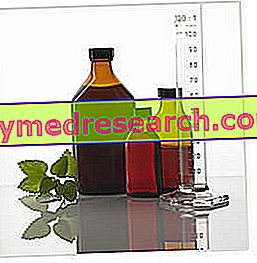What is phytotherapy?
The term "phytotherapy" comes from the Greek "phytòn", which means "plant", but at the same time also "creature": it is curious how this double meaning hides a profound concept. The root, in fact, derives from the verb "phyto" (to generate and to be generated), which indicates the process of fertility, of creation: it is possible to notice an evident parallelism that unites a plant to being, that is, to man and life.
Phytotherapy in history

Already in the Middle Ages the plants were used in the treatment of many ailments and to lighten the sufferings of the sick.
Once upon a time there were no current synthetic molecules (most of which derived from natural molecules): in order to heal, plants were used and the gifts nature offered to man were exploited, such as cultivated and spontaneous medicinal herbs. Although we are not aware of the scientific reasons of effectiveness, even our ancestors practiced phytotherapy, albeit in a simplistic way compared to the current one. Natural remedies were handed down from generation to generation, representing a wealth of experience in order to keep the body healthy. It is understandable that the therapy of medicinal plants was suitable for alleviating the lesser evils, while for the most serious pathologies remained only faith, prayer or resignation.
Phytotherapy today
If natural medicine in general, and phytotherapy in particular, have been abandoned for a short time, coinciding with the "boom" of conventional modern medicine, the opposite phenomenon has been recorded in recent years: the side effects caused by the drugs of synthesis have renewed interest in the "natural" approach. A good portion of the population has therefore registered greater attention and a marked awareness of phytotherapy.
Phytotherapy is the medical science that studies the correct use of medicinal plants and their derivatives, in order to treat or prevent various diseases and conditions of purely medical interest (drugs) or health (supplements).
To define the nature and treatment of diseases, modern herbal medicine refers to the same principles of conventional medicine based on evidence of efficacy, but using only remedies of plant origin. According to the WHO, phytomedicines are to be considered "finished medicinal products, labeled, which contain as active ingredients exclusively plants or associations of plants in the raw state, in the form of preparations. They also include juices, gums, lipid fractions, oils essential substances and all other substances of this kind ". Often, these phytomedicines are to all intents and purposes drugs of plant origin, because they are aimed at performing a therapeutic action. Their effect depends on the nature and concentration of the pharmacologically active chemical constituents: although for each plant source characteristic active ingredients have been roughly identified, to which a certain therapeutic action is ascribed, in the vegetable source there are other extraordinary mines of complementary substances which contribute to modulating their action (see phytocomplex concept).
Just like synthetic drugs, herbal remedies are taken in weight quantities, commensurate with body weight and not strongly diluted as is the case with homeopathic remedies. One must never forget, however, a very important concept: phytotherapy should not be understood as a true "medicine that cures evil", but rather as a remedy to lighten the disorder or an expedient to maintain the health of the body and the spirit.
Applications
Phytotherapy can find an important application when approaching the use of conventional drugs: it is a good rule, however, to always follow the doctor's advice, to avoid unpleasant consequences of interference. For example, you should never take hypericum ( Hypericum Perforatum ) with other medicines, because it could modulate the absorption of the drugs you take. This is why herbal medicine is also the responsibility of the doctor, as well as of the herbalist. Competence and responsibility are two essential qualities for a doctor, even in the phytotherapeutic field, because sometimes the life and health of people depend on the doctor himself.
To make the concept even clearer, it must be emphasized that the synthetic drug, protagonist of conventional medicine, often limits itself to treating the symptoms without acting on the causes; the grass, a prominent figure in the phytotherapic landscape, and alternative medicine in general, instead aim to alleviate the underlying cause of the disorder, taking care of the individual as a whole and his health at 360 degrees (importance of a correct dietary style and life, meditation, physical activity etc.). Probably, it is precisely for this reason that the man of the third millennium has come closer to phytotherapy and to complementary or unconventional medicines, with the aim of eradicating the disorder to its foundations.
Self-medication
The rediscovery of herbal medicine, in the last two decades, has led scholars to analyze medicinal plants with a more critical and careful eye: although herbal remedies have existed since the dawn of life, in some cases a scientific certainty has not yet been reached which justifies the therapeutic effects demonstrated by empirical use and popular tradition. So many people choose self-medication with herbs with supposed therapeutic properties: by doing so, they make the mistake of relying on personal, philosophical concepts and ideas without a scientific foundation, which as such do not lead to any concrete result, if not, sometimes, to the worsening of the pre-existing situation.
Therefore the use of phytotherapy in support of conventional medicine is correct, but always under the advice of a competent and experienced person, because even plants can hide undesirable side effects.



